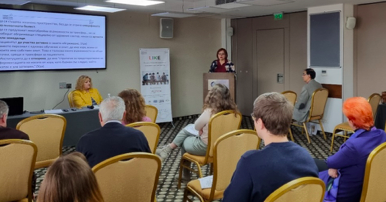The COVID-19 pandemic has added up more to the fears of modern society – terrorism, economic uncertainty and recession, immigrants, and climate change. The rumble from the media only worsened the picture.
The fear, Heinz Bude – a german sociologist writes in his book “Society of Fear” 2014, reveals the direction in which a society is moving and probably is the only imperative that could unite its members. There are some elements related to the pandemic that affect the population more, such as separation from loved ones, loss of freedom, uncertainty about the spread of the disease and feelings of helplessness. These aspects can lead to dramatic consequences, such as an increase in suicides. Suicidal behaviour is often associated with feelings of anger driven by the stressful condition widespread among people who lived/live in the most affected areas.
As a result of the COVID-19 pandemic the number of sad and desperate people has grown
I see it every day in my practice among the clients of “Hidden Likes” Youth House. More people are hyper-anxious, and the measures to combat the pandemic have affected people’s psyche, mostly the fear of contracting the coronavirus.
I see more people with panic attacks, more hypochondria, and more confusion and hesitation about who to believe. Staying at home certainly led to alcohol, drugs and food abuse and more domestic violence. Some people reacted with denial and even paranoia.
The pandemic has the strongest impact on people who are subject to both threats – in the risk group due to illness (or with an elderly parent at home) but also threatened by financial instability. They are faced with the decision of which threat to avoid in the first place. In this case, confusion and disorganized behaviour can go a long way.
Social isolation was somewhat compensated by the various ways of communication, but the absence of sports, walks, sunlight and above all security of life, health and income, made many people depressed, upset and confused.
What is happening after the pandemic?
The difference between normal anxiety and diagnosis is only quantitative. Anyone can have neurotic symptoms, and simultaneously unconsciously transform their anxiety into palpitations, tremors, shortness of breath, dizziness, obsessive thoughts, rituals, phobias, blockages and even paralysis and seizures. (This is a discovery of Sigmund Freud, which is not forgiven because the human psyche protects itself from the truths it does not want to know.). The problem of the shortage of doctors and nurses, which the pandemic – like any crisis – has exacerbated even more, brings in its wake another: the burnout of doctors, that no one speaks publicly about. Between 68.7% and 85.5% of medical staff are women with an average age of 26–40, and women are more likely to be affected by anxiety, depression and distress. Age and pandemic-related depressive symptoms have been linked. Medical staff under 30 years of age reported higher self-reported depression scores and greater concern about contagion to their families than did those at an older age. The staff over the age of 50 reported increased stress due to the death of a patient, extended working hours and lack of personal protective equipment. It cannot be any different in Bulgaria and in other countries, partners of the project LIKE.
Has the pandemic not changed the attitude towards mental health in Bulgaria and Europe?
In Bulgaria, people with severe mental disorders and their families are practically abandoned by the state(except for the provision of medication, which is not enough). Frequent mental disorders (anxiety, eating disorders, addictions, etc.) have become very widespread, for which there is almost no psychotherapy offered in the health system.
A few years ago I wrote a book called “The Truth About Mental Illness”. When we were preparing the documents at the printing office, one of the employees there said: “I don’t want to know her!” I don’t want to know the truth about mental illness!” And this is a normal reaction, but there are also people who manage the mental health system in Bulgaria and they should know that the UN Convention on Human Rights is not respected and any mentally ill person can condemn the Republic of Bulgaria if he wishes to. Freud’s thesis that even the greatest calamities cannot cause insight into unpleasant facts is confirmed.
Ms Elka Bozhkova – clinical psychologistexpert in projects LIKE


